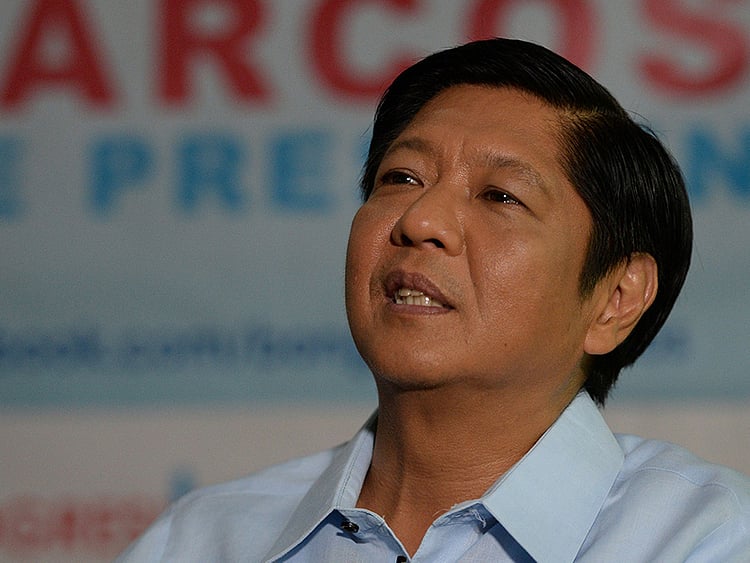Young Marcos says possible victory a vindication of his father’s rule
Vice-presidential candidate calls his father’s legacy the ‘golden age’ of the Philippines

Manila: Senator Ferdinand Marcos Jr, who has topped two pre-election surveys for vice-president, said his possible victory on May 9 could be a “vindication” of his father’s rule, former strongman Ferdinand Marcos who was shamed by a people-backed military mutiny in 1986. His era began in 1965 and he established a Martial Law in 1972.
In campaign rallies, the young Marcos called his father’s legacy the “golden age” of the Philippines, citing roads and bridges that were built; government run hospitals such as Heart Centre, Lung Centre, Kidney Transplant Centre, Philippines’ Children Medical Centre that were erected; the Philippine General Hospital and the Manila Orthopedic Hospital that were refurbished, all of which have been aiding poor patients. The young Marcos also cited Manila’s Cultural Centre of the Philippines and other government-run infrastructure that promoted Philippine arts and culture.
Political analyst Prospero de Vera said the young Marcos has survived castigations of President Benigno Aquino whose father, Senator Beningo Aquino, was shot by government security forces at the stairway of the China Airlines plane at the international airport on August 21, 1983. It sparked an anti-Marcos sentiment and protest rallies that was capped by the 1986 “people power” which propped up Mrs. Corazon Aquino to the presidency — she also established her country’s democratic institutions.
“The attention given to me and to my candidacy has been increasing. My supporters are increasing in number,” said the young Marcos.
“I’m kind and quiet,” said the former Princeton and Wharton School of Economics student when asked to define himself.
“I have not joined the bandwagon of politicking and mudslinging. I answer peoples’ question on how I can help make their lives better. I am continuing my message of unity — it is more important for our people,” said Marcos about his platform of government.
Talking about detractors, Marcos said, “It’s very clear that criticisms against me are coming from President Aquino. That is not surprising. We are not political allies. I expect more criticisms from him.”
In campaign rallies of the ruling Liberal Party’s presidential candidate Mar Roxas, and vice presidential candidate Leni Robredo, Aquino called the Marcos’ era the “golden age of Philippine debt and Moro (Muslim) abuse”.
Leftist groups have also forged a coalition to stop the election of the young Marcos as vice president. Their campaign rallies included pictures of the young Marcos with an “X”. “He would change Philippine history,” one activist warned.
Art gallery owner Norma Liongoren in New York, Cubao, suburban Quezon City said, “Never again,” repeating the title of an art exhibit of artists who depicted plunder and human rights violations during the Marcos era. The alleged ill-gotten wealth of Marcos was estimated in 1986 at $35 billion, excluding an estimated $5 billion worth of stolen gold bars. The amount was downgraded later to $15 billion.
But Filipino voters have moved on. Alan Doroteo, 55, from Hong Kong who came home to vote on May 9, said, “I am voting for Sen. Marcos because he is a Marcos. His father had done something that other presidents after him failed to do.”
“Many people are voting for Sen. Marcos because of frustration. The incumbent administration has been privatising government hospitals to the disadvantage of poor people,” said Jenny Simunek, a former anti-Marcos activist at the University of the Philippines in the 70s. “The Marcos dictatorship built bridges, roads, the first elevated train system in Manila, several infrastructure that people can relate to. These were contrasted with legacies of other presidents that are a bit more abstract like freedom,” said sociologist Nicole Curato.
Senator Edgardo Angara added, “The young Marcos talks sense, and he has charm.”
Plunder case was never filed against the old Marcos because he was pushed to live in exile n the United States in 1986. A Philippine law says no case can be filed against an absent person, a lawyer explained, adding the government has recovered part of the Marcos ill-gotten wealth from business allies who admitted having fronted for the former strongman. But Eduardo Cojuangco, a former Marcos business crony and relative of Mrs. Aquino, did not do that in 1986.
“That should be taken against the two Aquino governments,” said an observer.
After the death of the elder Marcos in Hawaii in 1989, the Philippine government allowed the surviving Marcos family members to return in 1990. Cases filed against them included late payment of taxes, and (for Mrs. Marcos) juggling of funds when she served the government, Plunder cases were never filed against them.
Since then, Mrs. Imelda Marcos and her daughter Imee have won seats at the House of Repesentatives. Both served as governors of Ilocos Norte. Sen. Marcos was also governor of Ilocos Norte before he was elected senator in 2010.
Sign up for the Daily Briefing
Get the latest news and updates straight to your inbox
Network Links
GN StoreDownload our app
© Al Nisr Publishing LLC 2025. All rights reserved.